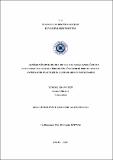DSpace Repository
GENİŞLEMİŞ SPEKTRUMLU BETA-LAKTAMAZ (GSBL) ÜRETEN ENTEROBACTERIACEAE TÜRLERİNİN SÜTLERDEKİ PREVELANSI VE ANTİBİYOTİK DİRENÇLİLİK DURUMLARININ İNCELENMESİ
JavaScript is disabled for your browser. Some features of this site may not work without it.
| dc.contributor.author | Gökalp, Fatma
|
|
| dc.date.accessioned | 2019-04-28T06:18:50Z | |
| dc.date.available | 2019-04-28T06:18:50Z | |
| dc.date.issued | 2015-09 | |
| dc.identifier.uri | http://hdl.handle.net/11547/1551 | |
| dc.description.abstract | Genişlemiş spektrumlu beta-laktamazlar (GSBL) penisilin, sefalosporin ve monobaktamlar gibi beta laktam antibiyotikleri hidrolize edebilme yeteğine sahip enzimlerdir. Özellikle GSBL üreten Gram negatif enterobakterilerin hayvansal gıdalardaki artan yayılımı gıda güvenliği ve halk sağlığı açısından Dünya genelinde önemli bir sorun haline gelmiştir. Bu çalışma İstanbul ili ve çevre bölgelerden toplanan 135 adet çiğ süt örneğinde GSBL-üreten Enterobacteriaceae familyası üyesi bakterilerin varlıklarını araştırmak amaçlanmıştır. Örnekler sırasıyla Enterobacteriaceae zenginleştirme buyyonda ön zenginleştirme işlemine alınmış ve devamında kromojen GSBL selektif agar üzerine sürme yöntemle ekim yapılmıştır. İnkübasyon sonunda selektif besiyerinden gelişen GSBL şüpheli izolatlar Trypton Soy agarda subkültür edilerek saflaştırılmıştır. Saflaştırılan kolonilere oksidaz testi uygulanmış ve oksidaz negatif sonuç veren izolatlar ütle Spektrometeresi (Vitek® MS, bio Meriux) ile tiplendirilmişlerdir. Tiplendirmesi yapılmış GSBL şüpheli enterobakterler seftazidim (CAZ), sefotaksim (CTX) ve sefpodoksim (CPD) antibiyotik diskleri kullanılarak GSBL varlığı bakımından taranmışlardır. GSBL şüpheli izolatların doğrulaması klavulanik asit (CV) içeren türdeş diskler kullanılarak yapılmıştır. esin GSBL şüpheli türlerin konfirmasyonu ve İ değeri tayini erlin Micronaut-S beta-lactamase VII kiti prosedürü takip edilerek sıvı mikrodilüsyon yöntemiyle gerçekleştirilmiş, okulamalar multiscan spektrometre ile alınmış ve okuma sonuçları otomatik olarak bir yazılım tarafından değerlendirilmiştir. GSBL tarama ve doğrulama testlerinin tümü Clinical and Laboratory Standarts Institute (2013) talimatları takip edilerek uygulanmıştır. İncelenen çiğ süt örneklerinden toplam 40 adet GSBL şüpheli Enterobacteriaceae izolatları elde edilmiştir. GSBL konfirmasyonu testi sonucu bu izolatların 29 adeti kesin GSBL pozitif olarak tespit edilmiştir. En baskın GSBL-üreten fenotip E. coli (%79,4) olarak belirlenirken, bunu E. cloacae (%10,3) ve C. braakii (%10,3) izlemiştir. Elde edilen bulgulara göre; çiğ süt örneklerinde GSBL-üreten Enterobacteriaceae türlerinin varlıkları tespit edilmiş olup, halk sağlığı açısından potansiyel risk oluşturdukları sonucuna varılmıştır. Son yıllarda antibiyotiklere dirençli bakterilerin görülme sıklıklarındaki artış sebebiyle bilinçli antibiyotik kullanımı politikalarının yaygınlaştırılması ve GSBL-üreten enterobakterilerin gıda güvenliği gösterge parametere olarak kodekslere konulması gerekmektedir. | tr_TR |
| dc.language.iso | tr | tr_TR |
| dc.publisher | İSTANBUL AYDIN ÜNİVERSİTESİ FEN BİLİMLERİ ENSTİTÜSÜ | tr_TR |
| dc.subject | GSBL | tr_TR |
| dc.subject | Enterobacteriaceae | tr_TR |
| dc.subject | Süt | tr_TR |
| dc.subject | Halk Sağlığı | tr_TR |
| dc.subject | Enterobacteriaceae | tr_TR |
| dc.subject | ESBL | tr_TR |
| dc.subject | Milk | tr_TR |
| dc.subject | Public Health | tr_TR |
| dc.subject | Food Safety | tr_TR |
| dc.subject | Gıda Güvenliği | tr_TR |
| dc.title | GENİŞLEMİŞ SPEKTRUMLU BETA-LAKTAMAZ (GSBL) ÜRETEN ENTEROBACTERIACEAE TÜRLERİNİN SÜTLERDEKİ PREVELANSI VE ANTİBİYOTİK DİRENÇLİLİK DURUMLARININ İNCELENMESİ | tr_TR |
| dc.type | Thesis | tr_TR |
| dc.description.abstractol | Extended spectrum beta-lactamases (ESBL) are the enzymes that hydrolyze modern beta-lactam antibiotics such as penicillins, cephalosporins, monobactams and aztreonam. The increasing prevelance of ESBL-producing Gram negative bacteria has become a problem worldwide for food safety and public health. The objective of this study was to investigate the prevalence of ESBL-producing Enterobacteriaceae in a total of 135 raw milk samples collected from Istanbul and the surrounding districts. After pre-enrichment in Enterobacteriaceae Enrichment broth and selectıve enrichment on a chromogen ESBL media, the colonies were subcultured onto Trypton Soy agar for purification. The purified isolates were initially exposed to oxidase testing. Subsequently, the oxidase negative ones were selected and identified by using mass spectrometer (Vitek® S, bio Meriux). The characterized ESBL suspected strains were screened for ESBL-production by ceftazidime (CAZ), cefotaxim (CTX), and cefpodoxime (CPD) dıscs respectively. The ESBL-suspected isolates were confirmed with a combination of ceftazidime (CAZ), cefotaxim (CTX), and cefpodoxime (CPD ± clavulanate (CV) discs based on combined disc-diffusion testing. Following that, the final confirmation of ESBL-production wthin the isolates were performed following the instructions of Merlin Micronaut-S beta-lactamase VII testing kit based on liquied microdilution, the readings were obtained by a multı-scan spectrometer, and the data was automatically analyzed by the sıfın a software. All the ESBL screening and confirmatory testings were conducted according to the criteria by Clinical and Laboratory Standarts Institute (2013). The results revealed that the phenotypic screening for ESBL production yielded 40 suspected isolates in Enterobacteriaceae. Of 40 isolates, 29 of them were confirmed as ESBL-producer. The most common phenotype was determined to be E. coli (79.4%), followed by E. cloacae (10.3%), and C.braakii (10.3%), respectively. To conclude, our study indicated that the raw milks were significantly contaminated with ESBL-producing Enterobacteriaceae, potentially leading to a risk to the public health. In the recent years, we strictly advise that the antibiotic agents used for the farming animals should be carefully controlled, and the ESBL-producing enterobacteria should be included in the food regulations as a food safety indicating parameter. | tr_TR |
| dc.publisher.firstpagenumber | 1 | tr_TR |
| dc.publisher.lastpagenumber | 57 | tr_TR |
Files in this item
This item appears in the following Collection(s)
-
Tezler -Thesis [265]
